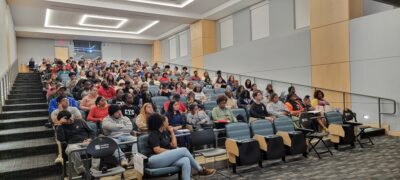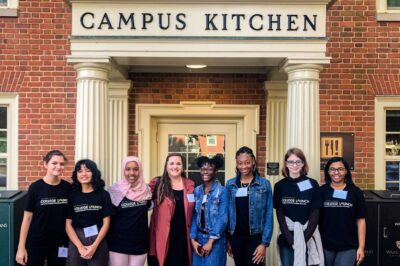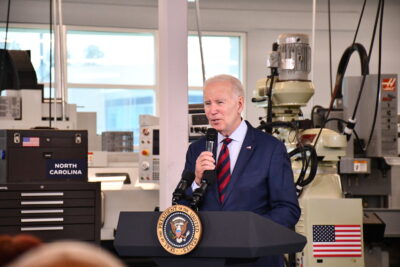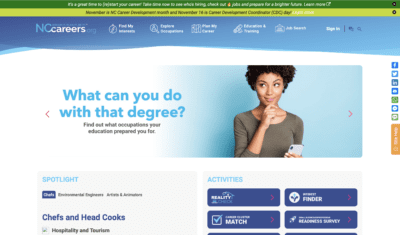
|
|
Gov. Roy Cooper declared March Students@Work℠ Month in North Carolina, in recognition of the career readiness initiative expected to teach 25,000 students in the state about jobs and industries in their communities.
Students@Work, a partnership between the North Carolina Business Committee for Education (NCBCE) and the North Carolina Department of Public Instruction (DPI), involves on-site and virtual visits to local businesses. This is the 14th year for the project.
“This innovative program gives North Carolina students a front row seat to explore careers and learn what it takes to prepare for their future jobs,” Cooper said in a press release. “Employers including state government are excited to take part in Students@Work℠ to help inspire our next generation of workers and leaders.”
Throughout the month, 233 businesses will spotlight their prospective careers to North Carolina middle schoolers. Here is a look at the career focuses this year:
- March 1: Small Business and Entrepreneurship;
- March 4-8: Education, Health Care, and Public Service;
- March 11-15: STEM;
- March 18-22: Hospitality, Tourism, and Retail; and
- March 25-29: Manufacturing, Transportation, and Agriculture.
“Career Awareness is a critical first step in adding relevancy to academics and positioning students to successfully navigate career pathways,” the initiative’s website says. “Many students are unaware of the multitude of careers available within their state, and Students@Work helps bridge this gap.”
Why middle school?
In North Carolina and beyond, school districts and community colleges are increasingly promoting career exploration at a younger age.
The most recent state budget includes several provisions concerning career development for middle and high school students, championed by State Superintendent Catherine Truitt and DPI.
Among other things, those provisions mandate a new careers pathway course in middle schools, and the development of career development plans in seventh grade. In 10th grade, students must revisit and revise that plan.
In February, DPI also partnered with the N.C. Chamber to create a new toolkit businesses can use to establish partnerships with public schools across North Carolina. The toolkit links to the North Carolina Business Committee for Education (NCBCE) Navigator, which is provided at no cost to educators and employers and designed to connect classroom learning to career pathways.
Students@Work is run through that navigator tool.
“Middle school is a crucial time for dropout prevention and also when high school curriculum planning takes place,” a 2024 flyer for Students@Work says. “Direct experience with the workplace demonstrates the relevance of education and career awareness to future success.”
Read more about career exploration
Research has identified middle school as a time when students can benefit the most from career exploration, according to a 2018 report from the Association for Career & Technical Education (ACTE).
One of that report’s six recommendations included “enabling short-term interactions with business and community leaders.” The report also recommends exploratory and introductory career and technical education (CTE) courses.
Career exploration engages middle school students at a time when they are at a higher risk for disengaging from learning due to challenges in forming identity, coping with puberty and navigating new environments. It also capitalizes on their developing abilities to think abstractly, and their preferences for teamwork and active learning through relevant real-life scenarios. These preferences make middle school a natural time for students to learn about careers and develop skills such as problem solving, critical thinking and teamwork through career exploration activities
Excerpt from ACTE report
In 2022, Cape Fear Community College held its own Career Academy. The program allows eligible rising seventh, eighth, and ninth graders to attend a two-week, on-campus exploration of various CTE courses at the college.
“Middle school students are trying to determine who they are and what they want to be,” Cape Fear Community College President Jim Morton wrote in a June EdNC perspective. “By exposing this age group to various career fields, we are sharing the message that young people can be anything they want to be and do anything they want to do while also providing them with a sense of direction.”
In 2022, the academy pilot hosted over 200 middle school students. An “overwhelming community response” prompted the college to expand its program to accommodate 300 students for the 2023 summer camp.
The academy is scheduled to take place again this summer.
Morton said that such programs help students plan for graduation at a younger age with more confidence.
“Career exploration equips students and their families with the tools to make informed choices about secondary and postsecondary education and training,” he said. “The ultimate goal of career exploration is to fill a crucial need by providing equal opportunities for all students.”






